The U.S and Palau are discussing the permanent deployment of advanced missile defense systems in the Pacific island nation, Palau President Surangel Whipps said part of Washington’s efforts to check China’s influence in the region.
The revelation of talks over missile defence systems comes as U.S President Joe Biden host a second summit with Pacific island leaders at the White House on Monday.
While the meeting focus on climate change, economic development and health care, the U.S sees such high-level engagement as paving the way for more military cooperation to counter China. The competition for influence over Pacific countries has become more intense since Beijing signed a security pact with Solomon Islands in April 2022.
A U.S senior administration official recognised that the strategic competition motivated Washington to step up its engagement with Pacific island nations.
“There’s also no question that there is some role that [China] has played in all this, no question that its assertiveness and influence, including in this region, [have] been a factor that requires us to sustain our strategic focus,” the official told reporters.
Palau, which has received economic assistance from the U.S in exchange for defence cooperation under a decades-old agreement, is increasingly concerned about China’s aggressive maritime movement near its territorial waters.
A Chinese research vessel operated within Palau’s exclusive economic zone in May and August without permits, Whipps said in an interview.
“I think that’s a clear violation of the rule of law in our understanding,” Whipps said, adding “it sure looks” like the ship was conducting maneuvers to study the possibility of cutting off undersea cables in the event of a crisis.
“We expect that the U.S military should be present and also [help] deter these types of activities,” the president stressed, expressing his hope for more frequent port visits by U.S Navy ships.
“We are a believer that the way you preserve peace is through strength,” Whipps said, citing former U.S President Ronald Reagan’s foreign policy doctrine.
Palau has become an increasingly important partner for the U.S military due to its strategic location between the U.S territory of Guam and the Philippines.
The U.S has plans to install over-the-horizon radar systems in Palau in 2026. They are expected to enhance air and maritime domain situational awareness for U.S. and allied forces as the Chinese military extends areas of operation to the Pacific Ocean.
Palau has asked the U.S to deploy Patriot air defence systems because the radar systems may make Palau a more likely target in a conflict, Whipps said with China in mind. While Patriot systems were temporarily deployed there during an exercise, the island has requested permanent deployment.
“I think we made it clear to the U.S that if you’re going to have a radar site in Palau, you should also have Patriot missiles to defend us if we’re under attack,” the president said, adding that the U.S has “a clear understanding” of what is needed.
A U.S Defence Department spokesperson said that the Pentagon “routinely assesses requirements for what capabilities and assets to station and rotate throughout our military installations, as well as locations where we have access.”
“We remain deeply committed to our defense responsibilities in Palau… and look forward to continuing dialogue with Palau on U.S force posture there,” the spokesperson said.
The Patriot air defence system is capable of responding to a wide range of threats such as ballistic and cruise missiles, and aircraft. Ukraine is operating the defence systems to repel barrages of Russian missiles.
Although there are growing concerns that the U.S-China rivalry may be headed toward conflict, the biggest challenges facing Pacific island countries are climate change and economic growth.
Climate change is “destroying our crops. It’s invading our homes, and it’s really going to destroy our culture and our heritage, and what is so valued with us,” Whipps said.
But the U.S is not politically positioned to make long-term commitments, as Democrats and Republicans remain divided on climate change. Washington might scale back its climate pledge and assistance if a Republican wins the presidential election in November 2024.
This uncertainty over its climate commitment, along with China’s advanced economic engagement across the Pacific islands, has weakened Washington’s standing in the region.
State-owned Bank of China opened its first representative office in Papua New Guinea while Beijing proposed a free trade agreement with the island this year. This economic push took place after the U.S and Papua New Guinea signed a defense cooperation agreement in May.
The Biden administration acknowledged the U.S is lagging behind China in terms of economic support.
“Deep economic ties with China and security relationships with the United States is certainly not unique to PNG. That is a feature throughout the region,” a senior U.S defence official told members of the media traveling with Secretary of Defence Lloyd Austin to PNG in July.
“Our approach is to demonstrate value and to demonstrate the ways in which we can contribute meaningfully to a long-term, mutually beneficial security relationship,” the official said.
SOURCE: EURASIAN TIMES/PACNEWS














